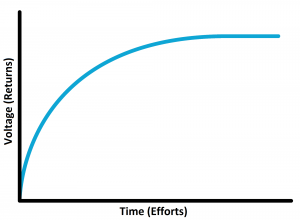 My mentor from my last job, David Lee Rutledge, held two significant positions as a head of R&D and later the CTO. Although I never had the opportunity to work directly under him, we collaborated for 15 years. One of the best lessons I learned from him is “Everything in life is an RC curve”.
My mentor from my last job, David Lee Rutledge, held two significant positions as a head of R&D and later the CTO. Although I never had the opportunity to work directly under him, we collaborated for 15 years. One of the best lessons I learned from him is “Everything in life is an RC curve”.
For an ELT presentation, I realized that I needed to make some last-minute changes, but when I found out that he had already sent a copy of the presentation to the ELT members, I started stressing out. Observing my worry, he drew an RC circuit and curve on the whiteboard and asked me if I had ever seen one before. I nodded and he said, “JP, everything in life is an RC curve.”
“When you are charging, you charge at a much fast rate. It’s like efforts on x-axis vs. returns on y-axis. As you get closer to the getting fully charged, a lot more effort is required to get a good return. Sometimes you need to go the extra mile to get the last ounce of returns, and it’s essential to know whether the return is worth the effort.”
He continued, “So relax, you made a great presentation. The additional changes you’re worried about are just noise. Focus on the signal.”
That was one of my great moments with David. Since then, I always plan and think before jumping in to ensure that I put in the right amount of effort to get the right returns. I’m still learning and seeking advice from others when needed.
So, remember the RC curve, know when to stop, and when to keep going. When in doubt, don’t hesitate to ask. After all, “Everything in life is an RC curve.”
JPS Nagi
April 18, 2023